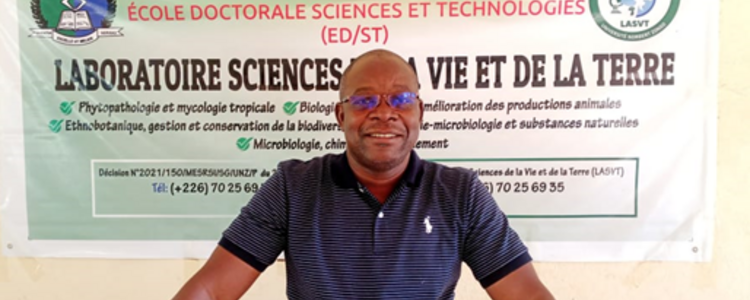Albert Soudré is a senior lecturer in animal breeding and genetics at Université Norbert Zongo (UNZ) in Burkina Faso. In addition to teaching, he holds a number of administrative posts. He is head of the Life and Earth Sciences Laboratory (LASVT) and Deputy Director of the Science and Technology Doctoral School (ED-ST). He is involved in a number of research projects, and is particularly interested in the genetic improvement of animals, the search for genes of interest and the characterisation of animal genetic resources. He is also interested in community life and is actively involved in a number of development associations, where he holds positions of responsibility. Assoc. professor since 2020, he aspires to become a full professor.
After Albert Soudré completed his PhD at the University of Natural Ressources and Life Sciences (BOKU) in 2011 he intitiated an APPEAR project with his former host university and burkinabe institutions. And became the national coordinator. The project, entitled Local cattle breeds of Burkina Faso Characterization and sustainable utilization (LoCabreed) ran from 2016 to 2021 and was a resounding success in terms of capacity building, results and scientific publications. The positive outcome has led to funding for a second phase, this time on Advancing local capacities for livestock breeding practice and research in Burkina Faso (LoCaBreed2.0). Albert as the national coordinator is looking forward to a wonderful and exciting 3-years period, as the consortium has been strengthened by the addition of new partners with diverse and complementary skills. The involved partners are competent, dynamic, enthusiastic, sociable and determined.
LoCaBreed2.0 aims to strengthen LoCaBreed's community-based breeding programmes (CBBPs); design and implement new CBBPs for cattle and goat populations; increase the participation of women and young people in CBBPs; develop and use digital tools for recording and marketing of animals; identify genomic regions underlying important production and health traits. An important feature of this project is the empowerment of LoCaBreed alumni to foster leadership and a results-oriented culture. This project is of great importance to Burkina Faso, as livestock farming is a major source of income for rural populations, as well as being a sub-sector that makes a substantial contribution to GDP. In addition, the project is helping to build a critical mass that will have a significant impact on research and higher education in Burkina Faso. It is also strengthening the skills of livestock farmers and taking their opinions into account in setting up and implementing livestock breeding programmes.
Albert completed his PhD at the University of Natural Resources and Life Sciences (BOKU) and did his laboratory work at the Veterinary Medicine University of Vienna (Vetmeduni). This training was very rewarding from both a scientific and human point of view. Also, his study in Austria improved his approach to teaching, his relationship with students, trainees and collaborators. The collaboration established in 2014 as part of the LoCaBreed preparatory phase is continuing and becoming even stronger. It has also enabled the collaboration to be extended to Ethiopian, Kenyan and American partners in addition to the traditional partners from Burkina Faso. The ambition is to be able to implement CBBPs throughout the country to contribute to genetic improvement and the safeguarding of genetic heritage. To achieve this, sustained efforts are being made through ongoing lobbying of the authorities in charge of livestock production in Burkina Faso. In the immediate future, work is underway to draw up and seek funding for a development project along these lines.
Albert Soudré joined the Norbert Zongo University (UNZ) in 2013 as a lecturer in the Department of Life and Earth Sciences. He is currently teaching courses in animal breeding and genetics, animal biology and reproduction. He is responsible for administrative and technical tasks as Head of the Life and Earth Sciences Laboratory and Deputy Director of the Science and Technology Doctoral School. He is involved in a number of research projects, and is particularly interested in the genetic improvement of animals, the search for genes of interest and the characterisation of animal genetic resources. He is also interested in community life and is actively involved in a number of development associations, where he holds positions of responsibility. Assoc. professor since 2020, he aspires to become a full professor.
